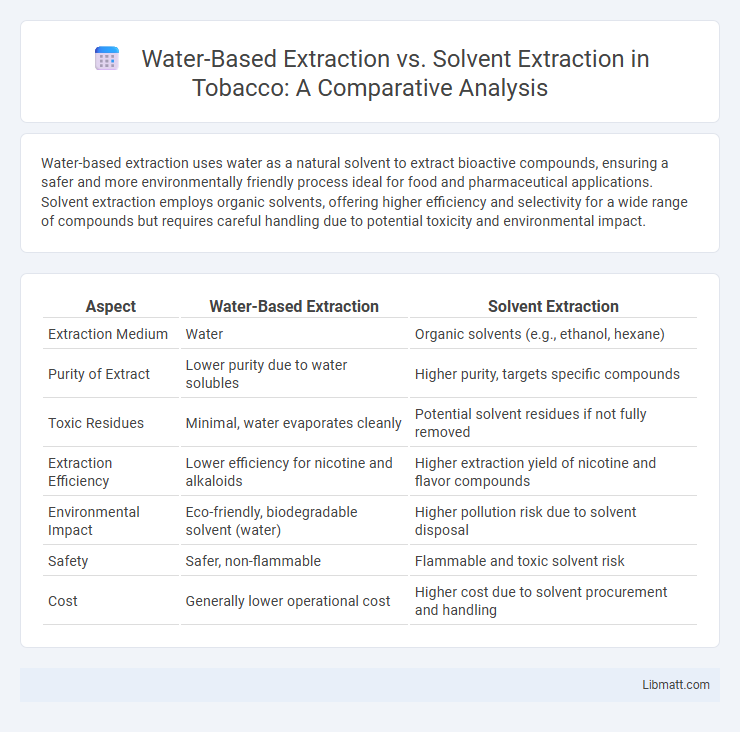Water-based extraction uses water as a natural solvent to extract bioactive compounds, ensuring a safer and more environmentally friendly process ideal for food and pharmaceutical applications. Solvent extraction employs organic solvents, offering higher efficiency and selectivity for a wide range of compounds but requires careful handling due to potential toxicity and environmental impact.
Table of Comparison
| Aspect | Water-Based Extraction | Solvent Extraction |
|---|---|---|
| Extraction Medium | Water | Organic solvents (e.g., ethanol, hexane) |
| Purity of Extract | Lower purity due to water solubles | Higher purity, targets specific compounds |
| Toxic Residues | Minimal, water evaporates cleanly | Potential solvent residues if not fully removed |
| Extraction Efficiency | Lower efficiency for nicotine and alkaloids | Higher extraction yield of nicotine and flavor compounds |
| Environmental Impact | Eco-friendly, biodegradable solvent (water) | Higher pollution risk due to solvent disposal |
| Safety | Safer, non-flammable | Flammable and toxic solvent risk |
| Cost | Generally lower operational cost | Higher cost due to solvent procurement and handling |
Introduction to Extraction Methods
Water-based extraction uses water as a natural solvent to separate bioactive compounds, offering a safer and eco-friendly alternative to solvent extraction, which relies on chemical solvents like ethanol or hexane. Solvent extraction often provides higher efficiency and selectivity for specific compounds but carries potential risks of residual solvent contamination. Your choice between these methods depends on factors such as target compound polarity, purity requirements, and environmental impact considerations.
Overview of Water-Based Extraction
Water-based extraction utilizes water as the primary solvent to separate desired compounds, making it a safer and more environmentally friendly method compared to traditional solvent extraction. This technique is particularly effective for extracting hydrophilic substances such as proteins, sugars, and certain bioactive compounds without the risk of toxic solvent residues. Your choice of water-based extraction supports sustainability while maintaining product purity and reducing potential health hazards.
Overview of Solvent Extraction
Solvent extraction uses organic solvents like hexane or ethanol to efficiently separate compounds from raw materials, offering high yield and purity in industries such as pharmaceuticals and food processing. This method excels in targeting specific bioactive compounds due to solvents' varying polarities, making it suitable for extracting oils, flavors, and essential nutrients. Your choice between solvent and water-based extraction depends on factors like efficiency, safety, and environmental impact, with solvent extraction often preferred for its precision and effectiveness.
Key Differences Between Water-Based and Solvent Extraction
Water-based extraction utilizes water as a solvent to selectively dissolve hydrophilic compounds, making it ideal for extracting water-soluble substances with minimal chemical residues. Solvent extraction employs organic solvents like hexane or ethanol to target lipophilic compounds, offering higher efficiency in isolating oils, flavors, and bioactive components but may require additional purification steps. The key differences lie in their solvent polarity, extraction efficiency, compound specificity, environmental impact, and safety profiles.
Efficiency and Yield Comparison
Water-based extraction typically offers lower efficiency and yield compared to solvent extraction due to limited solubility of target compounds in water. Solvent extraction achieves higher yields by utilizing organic solvents that dissolve a broader range of bioactive substances with greater selectivity. Extraction efficiency in solvent methods often surpasses 85%, whereas water-based extraction yields can drop below 60%, impacting overall productivity.
Safety and Environmental Impact
Water-based extraction is significantly safer and more environmentally friendly compared to solvent extraction, as it eliminates the use of harmful chemicals and reduces toxic waste generation. Solvent extraction often involves volatile organic compounds (VOCs) that pose health risks and environmental hazards, including air and water pollution. Choosing water-based extraction helps protect your health and minimizes ecological damage by utilizing non-toxic, biodegradable substances.
Applications and Industry Use Cases
Water-based extraction is widely utilized in the food and beverage industry for extracting natural flavors, oils, and bioactive compounds, offering a safe and eco-friendly solution for consumable products. Solvent extraction dominates pharmaceuticals and cosmetics due to its efficiency in isolating specific compounds, such as essential oils and active ingredients, with high purity levels. Your choice depends on the industry's regulatory requirements and the desired purity, with water-based methods favored for clean-label products and solvent extraction preferred for high-concentration extracts.
Cost Analysis and Scalability
Water-based extraction incurs lower operational costs due to the use of non-toxic, readily available solvents, reducing expenses related to solvent purchase and disposal. Solvent extraction often involves higher initial investment for specialized equipment and safety measures but can achieve higher purity and efficiency at scale. Scalability favors solvent extraction in industrial settings due to faster processing times, while water-based methods are more sustainable and cost-effective for small to medium scale production.
Quality of Extracted Compounds
Water-based extraction preserves the natural integrity and flavor of extracted compounds, minimizing chemical residues and ensuring a cleaner final product. Solvent extraction often yields higher concentrations of target compounds but may introduce solvent remnants that affect purity and safety. Your choice between these methods impacts the quality, safety, and sensory attributes of the extract, with water-based extraction favoring natural quality and solvent extraction emphasizing potency.
Choosing the Right Extraction Method
Water-based extraction offers a safer and more environmentally friendly approach, ideal for extracting water-soluble compounds without the risk of toxic residues. Solvent extraction provides higher efficiency and selectivity for non-polar substances, making it suitable for complex matrices where specific compound isolation is crucial. Your choice between these methods should balance the nature of the target compounds, desired purity levels, and environmental or safety considerations.
water-based extraction vs solvent extraction Infographic

 libmatt.com
libmatt.com